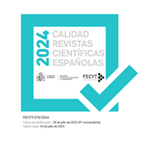Propuesta de etiquetaje pragmático para un corpus conversacional en español
Resumen
This paper proposes a system of pragmatic tagging for the VALESCO.HUMOR corpus, available at the Observahumor.com website. To date, the work of the GRIALE group has involved the study of irony and humour in Spanish, leading to the creation of a taxonomy of humour markers and indicators that serve to identify ironic and humorous utterances in the corpus. Markers are elements that help in the interpretation of an utterance as humorous (e.g., intonation or laughter), whereas indicators are humorous elements per se (e.g., certain suffixes or phraseological units). Timofeeva and Ruiz Gurillo (2021) have developed a pilot version of a pragmatic tagging system, based on markers and indicators, for the CHILDHUM corpus (also available at Observahumor.com). However, their system incorporates characteristics which are applicable to that specific corpus of children’s narratives, and as such cannot easily be extrapolated to all the corpora hosted at Observahumor.com. For this reason, it is necessary to carry out a detailed study of the pragmatic tags that might best be used towards a better interpretation of each text therein, and hence that would be suitable for each type of corpus. In the present study we present a proposal for the VALESCO.HUMOR corpus, which comprises 148 ironichumorous sequences extracted from 67 colloquial conversations of the Val.Es.Co. corpus (http://www.valesco.es/). The aim of this proposal is to provide the reader with all the necessary information to be able to interpret these humorous sequences and thus be able to analyse the corpus adequately..
Descargas
Descarga artículo
Licencia
La revista Círculo de Lingüística Aplicada a la Comunicación, para fomentar el intercambio global del conocimiento, facilita el acceso sin restricciones a sus contenidos desde el momento de su publicación en la presente edición electrónica, y por eso es una revista de acceso abierto. Los originales publicados en esta revista son propiedad de la Universidad Complutense de Madrid y es obligatorio citar su procedencia en cualquier reproducción total o parcial. Todos los contenidos se distribuyen bajo una licencia de uso y distribución Creative Commons Reconocimiento 4.0 (CC BY 4.0). Esta circunstancia ha de hacerse constar expresamente de esta forma cuando sea necesario. Puede consultar la versión informativa y el texto legal de la licencia.











